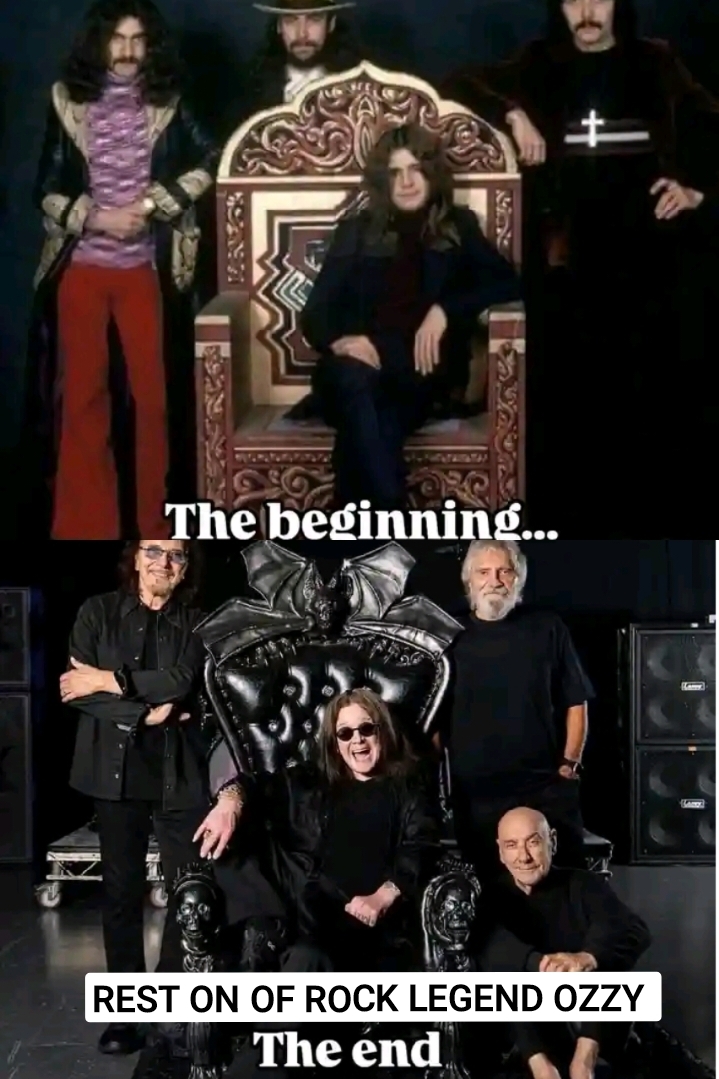Ozzy Osbourne: The Remarkable Beginning and End of a Rock Legend
From fronting Black Sabbath and creating the blueprint for heavy metal to shocking the world with outrageous antics, Ozzy Osbourne’s legacy is untouchable. His haunting voice and wild persona made him an icon, while his solo career cemented his status as the “Prince of Darkness.” Through decades of chaos, controversy, and unforgettable anthems, Ozzy defied the odds and survived it all. Now, as he nears the twilight of his career, the world salutes a true rock legend whose music, madness, and mythical tales will echo for generations, inspiring new rebels to carry his torch forever.
It all began in the bleak industrial streets of Birmingham, England, where a young John Michael Osbourne, nicknamed Ozzy, found solace from the grime and grind in the rebellious spirit of rock ‘n’ roll. Working dead-end jobs and fighting to escape poverty, Ozzy’s life took a turn the day he answered an ad posted by guitarist Tony Iommi, bassist Geezer Butler, and drummer Bill Ward. Together, they formed Black Sabbath—a band that would change the course of music forever.
Black Sabbath’s sound was darker, heavier, and more sinister than anything that had come before. The thunderous riffs, ominous lyrics, and Ozzy’s chilling voice summoned something primal in listeners. Their self-titled debut album in 1970, with its doomy title track, cast a spell over disillusioned youth. With songs like “Paranoid,” “Iron Man,” and “War Pigs,” they gave voice to a generation restless with war and uncertainty. Ozzy, clad in flowing coats, crosses, and wild hair, became a symbol of raw rebellion.
But Ozzy’s rise was not without self-destruction. Fueled by drugs and alcohol, the man behind the voice spiraled into chaos that both horrified and fascinated the public. Tales of hotel room wreckage, biting the head off a dove at a CBS Records meeting, and the infamous bat incident onstage became rock folklore. For every scandal, the legend grew. In the eyes of his fans, Ozzy was untouchable—an immortal force living life on the edge.
Eventually, his vices caught up with him, and Sabbath ousted him in 1979. For most, this would have been the end—a cautionary tale. But for Ozzy, it was just the beginning of another, even wilder chapter. With the unwavering support of his formidable wife and manager, Sharon, Ozzy launched a solo career that redefined him for a new generation. The release of Blizzard of Ozz in 1980, featuring the legendary Randy Rhoads on guitar, stunned critics and fans alike. Tracks like “Crazy Train” and “Mr. Crowley” became anthems of defiance and survival.
Tragedy struck again when Rhoads died in a plane crash in 1982. The loss shattered Ozzy, yet he pressed on, channeling pain into his music and performances. Albums like Diary of a Madman and No More Tears solidified his place as a solo giant. His shows were spectacular circuses of darkness, complete with fake blood, dungeons, and a carnival of the macabre that drew legions of diehard followers.
Through the eighties and nineties, Ozzy’s star refused to fade. Younger generations discovered him anew, thanks in part to MTV, rebellious teens passing around tapes, and Ozzy’s shocking antics that kept him in the headlines. But behind the “Prince of Darkness” mask was a man grappling with addiction, near-death experiences, and the heavy burden of being a living myth.
The 2000s brought an unexpected twist. The Osbournes, his family’s reality TV show, turned the wild man of rock into an unlikely household name, introducing him to millions who had never heard “Paranoid” or “Bark at the Moon.” Fans watched, amused and endeared, as Ozzy stumbled around his mansion muttering profanities and mumbling through domestic life. It was raw, unfiltered, and impossibly humanizing. The show revealed the soft side of the bat-biting madman—a confused, funny father who loved his dogs and his eccentric family. The myth grew stronger, paradoxically, because it was so real.
As the years passed, Ozzy’s body bore the scars of a life lived at maximum volume. Countless surgeries, falls, and decades of wear took their toll. Still, he refused to stay silent. Albums like Ordinary Man and Patient Number 9 proved the voice remained—haunted but powerful, cracked yet commanding. Fans, old and new, clung to every word, every riff, every final tour announcement.
Now, as Ozzy nears his eighth decade on this earth, the world wonders how many more encores he has left. Yet in a way, it hardly matters. For true legends don’t fade—they transform. Ozzy’s music plays on, blasting through basement speakers, festival fields, and battered headphones worldwide. His story is retold in bars, whispered backstage before young bands take the stage, and emblazoned on T-shirts, tattoos, and tribute shows.
Somewhere, a teenager picks up a battered guitar and strums the opening chords to “Iron Man,” feeling the same electric thrill that a young Ozzy once felt when he first dreamed of something bigger than the factory walls of Birmingham. In this way, Ozzy Osbourne will never truly die. He is more than the Prince of Darkness—he is the eternal patron saint of rock’s misfits and dreamers.
If there is a final curtain, it will be drawn not with silence but with the roar of millions chanting his name. And when the lights dim and the amps cool, his echo will drift through every dive bar and stadium where guitars scream and drums thunder. The world may one day say goodbye to John Michael Osbourne, but Ozzy—the bat-biting, crowd-possessing, reality-defying rock god—will live on.
Some legends burn bright for a moment and vanish. Ozzy Osbourne burned like a supernova for decades—too bright to ever be forgotten. As long as there is darkness to embrace and a wild riff to summon it, Ozzy’s legacy will prowl the shadows. He is the original madman, the survivor, the fallen angel with a microphone. And when that final note fades, somewhere, somehow, a new madman will pick it up, crank it to eleven, and remind the world that rock never truly dies.
All hail Ozzy Osbourne—forever the Prince of Darkness, forever the king of misfits, forever the legend that no twilight can extinguish.
If you’d like, I can adapt this into a speech, an article
, or another style—just say the word!









